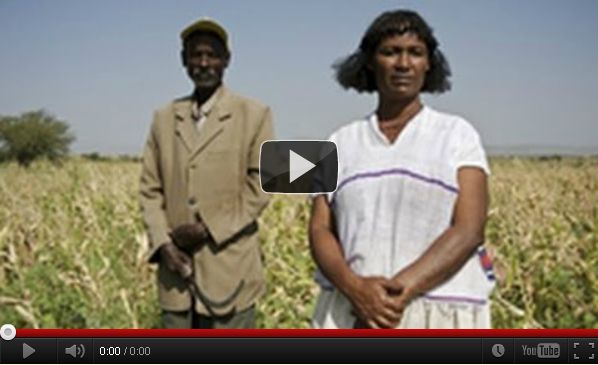
In 2010 Alun McDonald, Oxfam’s Media and Communications Officer for the Horn, East and Central Africa met Lekea Bornea, a farmer from the Oromia region in Ethiopia, who is feelings the effects of changing weather patterns and is featured in our latest ‘Faces of Climate Change’ short film.
“You’re our guests, so we’re going to feed you whether you’re hungry or not. That’s our way.” Lekea Borena places a bowl of steaming butter porridge on the table. It’s our first taste of local Oromian hospitality, and it’s delicious. It’s also deceptively spicy, especially for a 7am breakfast. My face turns red. “You like the peppers?” she grins.
The peppers used to be grown on Lekea’s small plot of farmland – along with peas, lentils and more. But now she has to buy them in the market, trucked in from hundreds of miles away. “Nobody here grows them anymore,” she says. Her children eagerly gulp down another bowl, but these days it’s a rare and expensive treat, saved for visitors and special occasions.
Out in the fields later that morning, Lekea explains why:
“There is not enough rain. I remember misty mornings, with the sky full of clouds. Even ten years ago there would be regular rainfall six months of the year. This year we had only two and a half. We’ve had to reduce what we grow. No more peppers or vegetables – now it’s just the basics like corn and sorghum.”
Even for these staple crops there is much less to harvest.
“We used to harvest enough corn to fill 22 sacks” (each sack weighing about 70kg). We were self sufficient – we ate what we needed and sold the rest. But in recent years, we average less than six sacks. It’s nowhere near enough.”
Around 75% of adults in the Oromia region rely on farming to make a living. Across the region, farmers tell of similar struggles as the rainy seasons become infrequent and unpredictable.
After seeing so many of their crops die, Lekea’s family has tried to adapt to the changes in the weather by planting varieties of seeds that need much less water.
But this has not always been a success – the Grass Peas that she now grows instead of normal peas help to feed the children, but can potentially damage bones or even cause paralysis if they eat too many of them.
“It’s a big worry for me. But the alternative is for us to go hungry.”
In October 2010 Oxfam supported people from the Oromia region to host a climate hearing, bringing together people to share their stories of climate impacts. Thousands of people attended. For Lekea it was the first time she spoke in front of such a big audience.
“I want to tell them that farmers here can thrive if we have support. We don’t want to rely on aid, but we need governments to help us have access to water, to make up for the lack of rain.”
At the climate hearing everyone agreed that the problem is getting worse and threatening their future. Lekea hopes that the people who attend the big global meetings on climate change work together to come up with solutions to this problem that we are all facing.
What you can do
- Watch: Lekea’s story
- Tell us what you think: Climate change is having profound impacts on communities like Lekea’s around the world. What actions do you think governments could be taking to support them?
- Act: become a UN Climate Tracker, and influence the international climate negotiations in Sth Africa